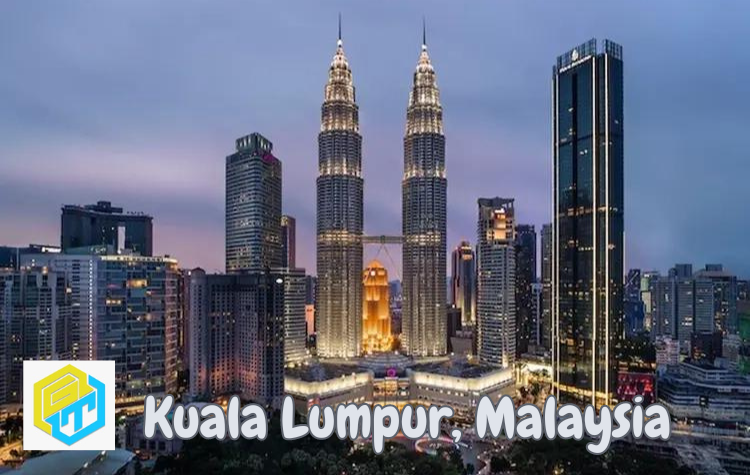If you are planning for your next overseas adventure, Asia offers diverse destinations catering to all travelers. In this guide, we will briefly overview the top cities in Asia for travelers in 2024/2025, showcasing their unique attractions, cultural experiences, and vibrant atmosphere.
Whether you are seeking bustling metropolises, historical sites, or natural beauty, these cities offer unforgettable experiences for the modern explorer. So, let’s dive into the top cities in Asia and start planning your next unforgettable journey. Welcome to an adventure-filled journey through the vibrant streets and rich cultures of Southeast Asia. From the bustling alleys of Hanoi to the dynamic energy of Ho Chi Minh City, and the modern marvels of Kuala Lumpur, get ready to immerse yourself in a tapestry of experiences that will ignite your senses and leave you craving for more. Hopefully it could be the best travel in Asia for tourists in 2024/25.
Hanoi, Vietnam
Hanoi, the capital city of Vietnam, is home to numerous attractions that offer visitors a glimpse into the country’s rich history and vibrant culture. One of the top attractions is the Imperial Citadel of Thang Long, a UNESCO World Heritage site that served as the political center of Vietnam for 13 consecutive centuries.

Another must-see in Hanoi is paying respects to “Uncle Ho” at the Ho Chi Minh Mausoleum, where visitors can view the embalmed body of the revered leader of Vietnam. This solemn experience provides insight into the nation’s deep respect for its founding fathers.
For those who appreciate coffee, Hanoi’s thriving coffee culture is a must-experience. The city is known for its unique egg coffee and traditional drip coffee, providing a delightful and aromatic experience for coffee enthusiasts.
Strolling around Hoan Kiem Lake is another essential Hanoi experience. The tranquil lake and its picturesque surroundings provide a peaceful retreat from the bustling city, with the iconic red bridge leading to Ngoc Son Temple adding to the scenic allure.
Overall, Hanoi offers a diverse range of attractions that cater to history enthusiasts, culture seekers, and those simply looking to immerse themselves in the city’s charm.
– Overview of Hanoi as the capital city of Vietnam
Hanoi, the capital city of Vietnam, stands as the vibrant political, economic, and cultural center of the country. With its rich history and cultural significance, the city attracts visitors from all over the world. Hanoi offers a unique blend of traditional and modern city life and serves as a gateway to other Northern Vietnam attractions.
Visitors to Hanoi can explore the historic Old Quarter, filled with narrow streets and bustling markets, and marvel at the grandeur of the Ho Chi Minh Mausoleum. The city is home to a myriad of cultural attractions, including ancient temples, museums, and theaters, showcasing Vietnam’s diverse heritage and artistic talent.
As a bustling tourist destination, Hanoi provides easy access to the natural beauty and cultural treasures of Northern Vietnam, making it a must-visit destination for travelers seeking a well-rounded experience.
Overall, Hanoi’s historic landmarks, cultural attractions, and strategic location make it a compelling destination for anyone looking to immerse themselves in the rich tapestry of Vietnamese culture.

– Cultural attractions such as Hoan Kiem Lake and the Temple of Literature
Hanoi, the capital city of Vietnam, is home to several cultural attractions that hold historical significance and play an important role in Vietnamese culture. Hoan Kiem Lake, situated in the heart of the city, is not only a beautiful natural landmark but also holds great historical and cultural importance. The lake is said to be the site where Emperor Le Loi returned the magical sword, which helped him defeat the Chinese Ming Dynasty, to the Golden Turtle God. This legend is deeply ingrained in Vietnamese folklore and is a testament to the resilience and independence of the Vietnamese people. The Temple of Literature, on the other hand, is a symbol of the country’s dedication to education and scholarship. Built in 1070, it is dedicated to Confucius and is also the site of Vietnam’s first national university. The temple showcases traditional Vietnamese architecture, with its meticulously designed courtyards, pavilions, and gardens. Both of these attractions provide a glimpse into traditional Vietnamese architecture and serve as memorials to literature and education. They are integral to Vietnamese culture, representing the country’s rich history and deep-rooted values. Hoan Kiem Lake and the Temple of Literature are not only tourist destinations but also hold a special place in the hearts of the Vietnamese people, making them essential cultural icons in Hanoi.
– Vibrant street food scene in the Old Quarter
When traveling to Hanoi, Vietnam, one cannot miss out on the vibrant street food scene in the Old Quarter. This bustling area is a food haven, where visitors can indulge in an array of local cuisine, from steaming bowls of pho to sizzling kebabs and everything in between. The streets are lined with a variety of food vendors, each offering their own specialties and flavors. This is a place where food becomes an experience, as locals and tourists alike gather to sample the diverse and delicious dishes that the Old Quarter has to offer. Whether it’s sitting on tiny plastic stools at a bustling street corner or exploring the night markets, this is a culinary adventure not to be missed.
Read More…Best places to visit in Asia in 2024/2025 for Travelers
Ho Chi Minh City, Vietnam
Ho Chi Minh City, formerly known as Saigon, is a bustling metropolis with a rich history and vibrant culture. The city is home to the famous War Remnants Museum, which offers a poignant look at the Vietnam War through various exhibits and displays. Another must-visit attraction is the Cu Chi Tunnels, a network of underground tunnels used by the Viet Cong during the war.

In addition to these historical sites, Ho Chi Minh City also boasts several other tourist attractions and historic landmarks, including the Notre Dame Cathedral, the Central Post Office, and the Reunification Palace. Visitors can also explore the bustling Ben Thanh Market, where they can shop for local handicrafts, souvenirs, and delicious street food.
The city’s cosmopolitan atmosphere is evident in its modern skyline, lively nightlife, and diverse culinary scene. Travelers can enjoy a wide range of activities, from sampling traditional Vietnamese cuisine to exploring the city’s art galleries and hip cafes. With its mix of history, culture, and modern amenities, Ho Chi Minh City offers something for every type of traveler.
– Introduction to Ho Chi Minh City (formerly Saigon)
Ho Chi Minh City, historically known as Saigon, is the largest city in Vietnam and holds a significant place in the country’s history. After the fall of Saigon in 1975, the city was officially renamed Ho Chi Minh City in honor of the revolutionary leader Ho Chi Minh, the founder of the Communist Party of Vietnam.
Today, Ho Chi Minh City is a bustling metropolis with a cosmopolitan atmosphere, displaying a blend of modern skyscrapers alongside colonial-era buildings. Its significance as a major economic and cultural hub in Vietnam is underscored by its numerous attractions, including the War Remnants Museum, the Reunification Palace, and the Notre Dame Cathedral Basilica of Saigon.
The city also offers a vibrant culinary scene, with street food vendors and upscale restaurants alike serving up delectable Vietnamese cuisine. Visitors can explore the lively Ben Thanh Market, take a stroll along the Saigon River, or indulge in the city’s dynamic nightlife.
Overall, Ho Chi Minh City is a fascinating destination that seamlessly integrates its rich history with modern developments, making it a must-visit for travelers seeking to experience the vibrant culture and heritage of Vietnam.
– Historical landmarks like the War Remnants Museum and Cu Chi Tunnels
As a city deeply rooted in the history of the Vietnam War, Ho Chi Minh City is home to several historical landmarks that provide insight into this tumultuous period. The War Remnants Museum is a poignant tribute to the victims of the war, showcasing photographs, artifacts, and documents detailing the atrocities committed during the conflict. It serves as a solemn reminder of the devastating impact of the war on both the Vietnamese people and American soldiers.
The Cu Chi Tunnels, located just outside the city, are an intricate network of underground tunnels used by the Viet Cong during the war. Visitors can explore the tunnels and gain a firsthand understanding of the challenges faced by the Vietnamese soldiers during the war. These tunnels were crucial in the Vietnamese resistance against American forces and played a significant role in the eventual victory of North Vietnam.
Both of these landmarks are essential in understanding the Vietnam War and its profound impact on Vietnamese history. They provide a somber reflection on the human cost of war and the resilience of the Vietnamese people in the face of adversity. These sites have also become crucial in promoting peace and understanding between the United States and Vietnam.
– Bustling markets and shopping districts like Ben Thanh Market
Bustling markets and shopping districts like Ben Thanh Market offer a vibrant and lively shopping experience for locals and tourists alike. These destinations are known for their diverse array of goods, from traditional handicrafts and souvenirs to fresh produce and delicious street food. Whether you’re in search of unique keepsakes, delicious local cuisine, or simply want to immerse yourself in the dynamic atmosphere of a traditional market, these bustling shopping hubs have something to offer for everyone.
Kuala Lumpur, Malaysia
Kuala Lumpur, the capital of Malaysia, is a vibrant city with a rich cultural heritage and stunning modern architecture. For travelers looking to visit this bustling metropolis, there are numerous top routes from major cities such as Singapore, Bangkok, and Jakarta, making it easily accessible from various parts of Asia.
Travelers to Kuala Lumpur should be sure to visit iconic landmarks like the Petronas Twin Towers and the Batu Caves. When exploring the city, it’s important to dress modestly, especially when visiting religious sites, and to be mindful of local customs and traditions.

For those needing to visit the Vietnam Embassy, it is located in the heart of Kuala Lumpur and offers consular services to Vietnamese citizens as well as visa and passport services for foreign travelers looking to visit Vietnam.
In conclusion, Kuala Lumpur is a dynamic city with plenty to offer travelers, from its top routes from major cities to its rich cultural experiences and iconic attractions. Whether you’re interested in exploring the city’s history, indulging in its diverse culinary scene, or simply taking in stunning views, Kuala Lumpur is a destination that should not be missed.
– Overview of Kuala Lumpur as a modern metropolis in Southeast Asia
Kuala Lumpur, the capital city of Malaysia, is a bustling modern metropolis in Southeast Asia. It is a city known for its towering skyscrapers, vibrant cultural diversity, and economic significance. The city’s top attractions include the iconic Petronas Twin Towers, one of the tallest twin towers in the world, and the majestic Batu Caves, a series of limestone caves and cave temples.

Kuala Lumpur is a melting pot of cultures, with influences from Malay, Chinese, Indian, and Western traditions, making it a fascinating destination for travelers seeking a taste of diverse experiences. The city’s economic significance is also evident through its impressive infrastructure and thriving business district.
In addition to its architectural wonders and cultural richness, Kuala Lumpur offers a vibrant nightlife and a diverse culinary scene. The city’s well-connected transportation system makes it easy for visitors to explore its many offerings, from street food markets to upscale shopping centers.
Overall, Kuala Lumpur is a dynamic and energetic modern metropolis that offers a rich tapestry of experiences for visitors from around the world.
Read More…Best Stainless Steel Tumbler Vacuum Water Bottles for 2024
– Iconic landmarks such as the Petronas Twin Towers and Batu Caves
Malaysia is known for its iconic landmarks, the most famous being the Petronas Twin Towers and the Batu Caves. The Petronas Twin Towers, once the tallest buildings in the world, are a symbol of Malaysia’s modernity and economic prosperity. They are also a representation of the country’s Islamic heritage, with the design drawing inspiration from Islamic art and architecture.

On the other hand, the Batu Caves are a series of caves and cave temples located on a limestone hill. The complex is one of the most popular Hindu shrines outside India, dedicated to Lord Murugan. The caves and temples are not only for their religious importance but also for their natural beauty and the annual Thaipusam festival that attracts thousands of devotees and tourists.
Both of these landmarks are important attractions for tourists and locals alike. The Petronas Twin Towers offer stunning panoramic views of the city from its sky bridge and observation deck, while the Batu Caves provide a unique cultural experience and a chance to explore the natural wonders of the caves.
Overall, these landmarks showcase the beauty and diversity of Malaysia, drawing in visitors from around the world to experience the rich cultural heritage and modern marvels of the country.
As your journey through these captivating cities comes to a close, take a moment to cherish the memories made, the flavors savored, and the friendships forged along the way. Whether it’s the aromatic pho in Hanoi, the pulsating nightlife of Ho Chi Minh City, or the awe-inspiring Petronas Towers in Kuala Lumpur, these destinations have left an indelible mark on your soul. Until we meet again on the next adventure, may your travels be filled with wonder and discovery. Safe travels, wanderer.










Wow! This can be one particular of the most useful blogs We have ever arrive across on this subject. Basically Excellent. I’m also a specialist in this topic therefore I can understand your hard work.
Thank you so much for the wonderful compliment! It means a lot coming from a fellow professional in the field. I’m glad you found the content helpful, and I truly appreciate your recognition of the effort put into it. Looking forward to sharing more insights with you in the future! 😊
you have a great blog here! would you like to make some invite posts on my blog?
Thank you very much. Yes please……